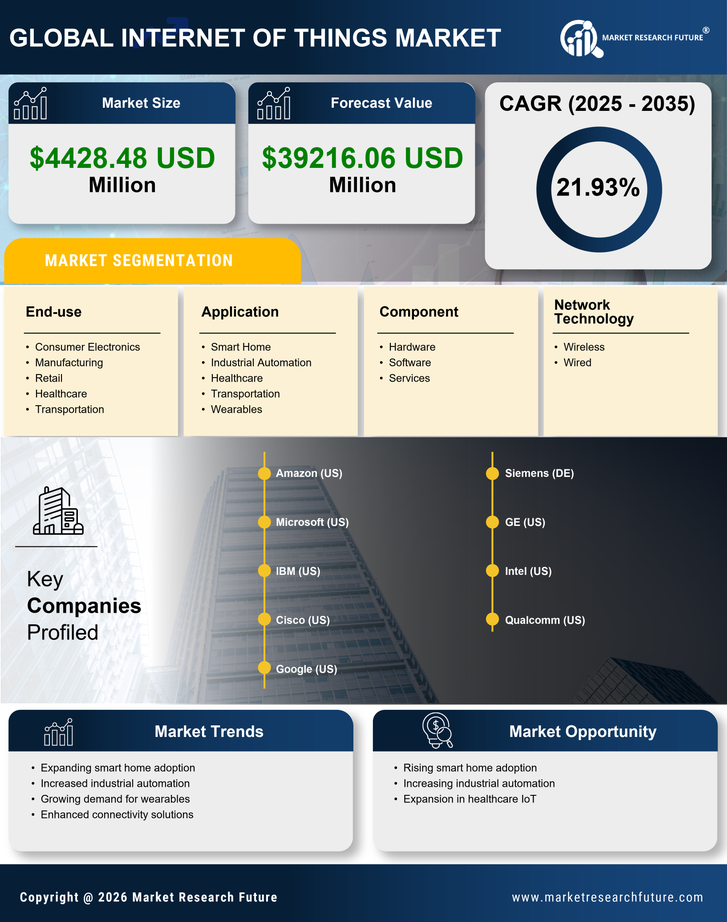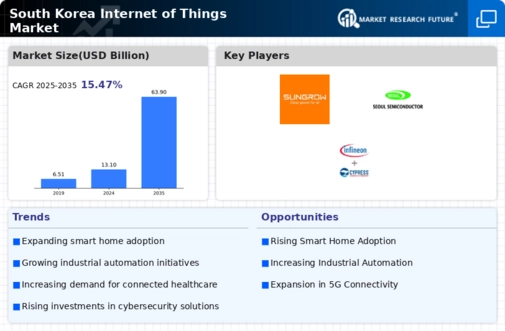Advancements in 5G Technology
The rollout of 5G technology in South Korea is significantly impacting the internet of-things market. With its high-speed connectivity and low latency, 5G enables a vast array of IoT applications across various sectors. As of November 2025, it is estimated that over 80% of South Koreans have access to 5G networks, facilitating the deployment of smart devices and applications. This technological advancement allows for real-time data processing and communication, which is crucial for applications such as autonomous vehicles, smart factories, and remote healthcare services. The enhanced capabilities of 5G are likely to drive the adoption of IoT solutions, as businesses and consumers alike seek to capitalize on the benefits of faster and more reliable connectivity. Consequently, the internet of-things market is poised for substantial growth as 5G continues to expand its reach.
Government Support for IoT Innovation
The South Korean government plays a pivotal role in fostering innovation within the internet of-things market. Through various initiatives and funding programs, the government aims to stimulate research and development in IoT technologies. In 2025, government investments in IoT-related projects are expected to exceed $1 billion, focusing on areas such as smart manufacturing, healthcare, and agriculture. This support not only encourages startups and established companies to innovate but also enhances collaboration between public and private sectors. By creating a conducive environment for IoT development, the government is likely to accelerate the growth of the internet of-things market, positioning South Korea as a leader in IoT technology. The strategic focus on innovation is expected to yield significant advancements and applications that will further drive market expansion.
Rising Demand for Smart City Initiatives
The internet of-things market in South Korea is experiencing a notable surge in demand for smart city initiatives. This trend is driven by the government's commitment to enhancing urban living through technology. As of 2025, South Korea has allocated approximately $1.5 billion to develop smart city projects, which integrate IoT solutions for traffic management, waste management, and public safety. The integration of IoT technologies in urban infrastructure is expected to improve efficiency and sustainability, thereby attracting investments and fostering innovation. Furthermore, the increasing urban population necessitates the implementation of smart solutions to address challenges such as congestion and pollution. This growing focus on smart cities is likely to propel the internet of-things market forward, as municipalities seek to leverage IoT capabilities to create more livable environments.
Growing Consumer Awareness and Acceptance
Consumer awareness and acceptance of IoT technologies are on the rise in South Korea, significantly influencing the internet of-things market. As individuals become more familiar with smart devices and their benefits, the demand for IoT solutions is expected to increase. Surveys indicate that approximately 70% of South Koreans are open to adopting smart home technologies, reflecting a shift in consumer attitudes towards connected living. This growing acceptance is likely to drive market growth, as manufacturers respond to consumer preferences by developing user-friendly and innovative IoT products. Additionally, the increasing availability of IoT devices at competitive prices is making them more accessible to a broader audience. As consumer awareness continues to evolve, the internet of-things market is poised for robust expansion, driven by a populace eager to embrace technological advancements.
Increased Focus on Cybersecurity Solutions
As the internet of-things market expands in South Korea, the emphasis on cybersecurity solutions becomes increasingly critical. With the proliferation of connected devices, the potential for cyber threats escalates, prompting businesses and consumers to prioritize security measures. In 2025, it is projected that the cybersecurity market in South Korea will reach approximately $3 billion, reflecting a growing awareness of the need to protect IoT ecosystems. Companies are investing in advanced security protocols and technologies to safeguard sensitive data and ensure the integrity of IoT devices. This heightened focus on cybersecurity not only protects users but also fosters trust in IoT technologies, which is essential for widespread adoption. As a result, the internet of-things market is likely to benefit from these investments, as secure solutions become a prerequisite for IoT deployment.

















